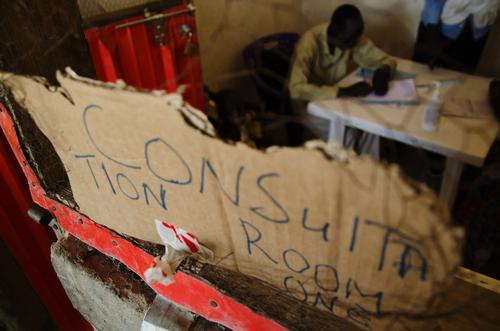Paris, 18 July 2014 – Around ten thousand South Sudanese children who are living as refugees in Adjumani district, northern Uganda are to receive the pneumococcal (PCV) and anti-Haemophilus (Hib) vaccines in a campaign run by Médecins Sans Frontières (MSF). However, this type of vaccination recommended by the World Health Organization (WHO) in emergency humanitarian situation remains difficult to implement.
Delay in increase in vaccinations
Since last year the WHO has recommended increasing the number of vaccines offered in humanitarian emergencies. However, it is very difficult to put these recommendations into practice for several reasons: delays to obtain authorization from the authorities, availability of vaccines at a good price and logistics to deploy in this type of emergency.
“There is a huge gap between the WHO recommendations and the possibility of implementing them in emergency settings,” says Dr Leon Salumu, medical referent for Uganda. “This relevant policy to protect vulnerable population is unfortunately not accompanied by resources and technical support necessary for its implementation in emergency situations.”
MSF excluded from lower prices
The cost of PCV is one of the main reasons vaccination campaigns cannot be more widely implemented in emergency settings where they are needed most. While GAVI (Global Alliance for Vaccines and Immunization) has negotiated a price of US$3.50 per dose, MSF is excluded from this lower price and forced to pay significantly more. For this current vaccination campaign, MSF is paying US$7.50 per dose.
“We don’t want to choose, and reduce the number of children we can vaccinate, based on pricing constraints,” says Dr Leon Salumu. “In emergency contexts, the timeframe for vaccinations, the choice of the vaccines to be provided, as well as the age groups of children to be vaccinated, should be based on medical and epidemiological factors, not on cost considerations.”
Vulnerable to diseases
People displaced from their homes in emergencies are particularly vulnerable to diseases that could be prevented by vaccinations. MSF’s current vaccination campaign is aimed at South Sudanese refugee children under the age of two. They will receive a vaccine providing protection against pneumococcal disease (PCV), as well as a conjugate vaccine against Haemophilus influenza type b (Hib) and other diseases. PCV and Hib are two of the main causes of respiratory infections in children. This campaign is the second implemented by MSF. The first was in South Sudan’s Yida refugee camp in 2013.
Despite the challenges, MSF is running further vaccination campaigns to protect almost 188,000 South Sudanese refugees in Ethiopia’s Gambella region against cholera and planning PCV and Hib vaccination.
More than 70,000 South Sudanese refugees are currently living in Uganda’s Adjumani region, where MSF teams are providing medical care, clean water and sanitation. In MSF health facilities in the area, respiratory infections are the second most common cause of medical consultations, hospitalization and death for children under the age of five.



